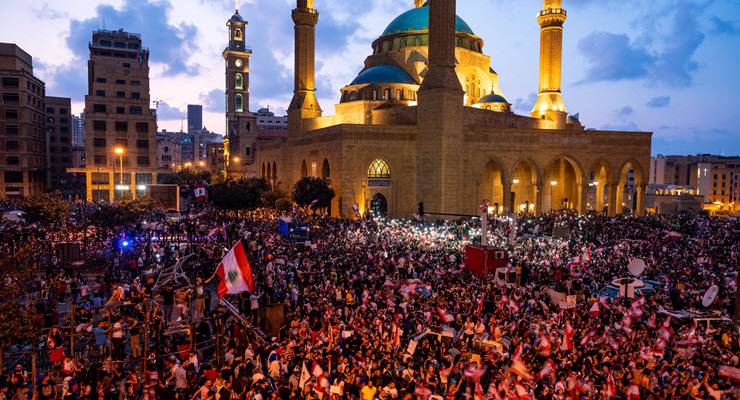
In the 2017 Lebanese short film The Last Days of Man Tomorrow, French president Charles De Gaulle comes to Lebanon with a gift to the people of an automaton named “Manivelle”. This nouvel homme — “new man” — is at first a celebrity but falls into ruin and eventually is largely forgotten — an obscure remnant of what was.
The new man that was Lebanon in the 1950s through to the 1970s is now a broken state, mired by sectarian politics and deeply rooted graft.
The explosion that ripped through Beirut on August 4, leaving over 200 dead and thousands more injured, was a purely preventable catastrophe and an indictment of Lebanon’s ruling elite. The government had the chance for proper due diligence back in 2014, when the store of ammonium nitrate at the centre of the explosion was docked at the port of Lebanon.
French president Emmanuel Macron’s visit to the blast site was welcomed — no senior Lebanese politicians had yet visited, perhaps fearing culpability and anger. It is a sign of the times when the historically colonised seem to have more faith in their former coloniser than their national leaders. France has been one of the leading countries in bringing financial aid to Lebanon.
Lebanon’s political system of power sharing, based on an anachronistic system known as confessionalism, is at the heart of the country’s ills.
Going back to World War I, a treaty known as the Sykes-Picot agreement saw the former Ottoman Empire carved into British and French spheres of influence which eventually came to define the Middle East. Some of those spheres were designed along sectarian and ethnic lines.
That imperial yoke has gone, through many variants and adjustments due to war and revolution. Lebanon is now a microcosm of the power balance that exists between what could be crudely seen as a pro-Western bloc, which looks to America’s partners in the region, and an anti-Western bloc that looks to Iran and Russia.
While the popular movement against Lebanon’s legacy elite, kicking off in October 2019, has had some success, it is seeking a huge change: to disrupt this long-entrenched power structure.
But what is the alternative? The political system in Lebanon has not worked. The country has not been able to fix its power supply problem in 30 years, and even basic council services are partisan issues. Nothing gets done when you have a political splinter that rules based on political loyalties rather than national interests.
The test of the protests’ success, and of any new government, will of course be accountability. For too long the ruling parties have escaped scrutiny and transparency. If no one is to blame, then it could be surmised that no one is responsible for the state — what you have is not a government but a group of self-interested clans vying for the biggest slice of the pie, unconcerned with building a functional state of checks and balances.
With an economy in free fall, high inflation, government instability, a global pandemic and now this disaster, Lebanon is again fighting to survive.
The recent US Caesar Act targeting Syria through sanctions has also had a compounding effect on the availability of the dollar in the country. With large damage to national stocks of staples, and the US dollar being the reserve global currency of trade, it will need access to money now more than ever.
Despite all this, the Lebanese are a resilient people and have shown their determination to rebuild and rebuild again. They refuse to be forgotten and relegated to what was, what is or to what may never be again.
The tale of Manivalle is cautionary, not destiny.
Whilst the government of prime minister Hasan Diab has resigned, those actions are reactive rather than proactive. The resignation is not likely to change the old hands in the political makeup of the country.
Lebanon does not need a nouvel homme, a bygone era unreflective of modern aspirations, but a new brand of politics — one concerned with rebuilding Lebanon for the new generation of Lebanese who have laboured under poverty, crumbling infrastructure and entrenched inequality.








Informative and helpful article. Thanks Daniel. Great to have this article in Crikey.
I know it shouldn’t make a difference, but I stayed relatively near the port in 2011 and I couldn’t help but think of those I met and if they’re okay.
For an amazing country (history, nature…those cedars!) and wonderful people, it sure has suffered beyond what any country should. My best wishes and thoughts are with the Lebanese people.
Alas for Lebanon. But let us also look at the role of the war criminals led by Ariel Sharon, the US invasion, the countless attacks by Israel on its southern borders, thereby giving oxygen to Hezbollah and the fact that it has 20% of its population as refugees from Syria, with the west doing SFA to help. Thanks to the Saudis and their malevolent partners Syria, once a source of help is now a ruin.
“Nothing gets done when you have a political splinter that rules based on political loyalties rather than national interests.”
I’m sure that is true. And it is also a dreadful warning to Australia, the UK and the USA of where our current political culture is going. Beirut today will be our tomorrows if the parties in power consolidate their control and lack of accountability.
Maronite Lebanese were the first non euroids allowed to immigrate here in the late 50s due to the confessional strife in the Levant.
When it again erupted in the 70s they begged Frazer not to allow the entry of the Others, warning that they would not assimilate and would become a problem for this country.